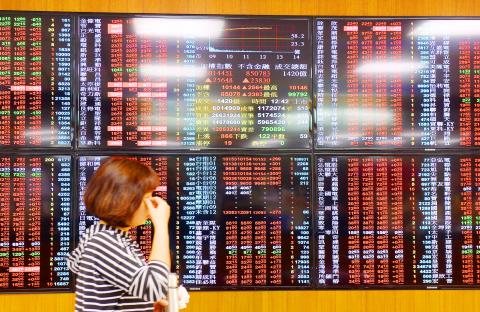The TAIEX yesterday jumped 2.53 percent to close at 10,137.87 points, breaching 10,000 points for the first time since Oct. 12, after US President Donald Trump and Chinese President Xi Jinping (習近平) on Saturday agreed to suspend new tariffs at the G20 meeting in Argentina.
The weighted index opened higher and rose to 10,055.41 points after two minutes of trading. It continued to climb throughout the session. It ended 249.84 points higher at 10,137.87, from its close of 9,888.03 on Friday.
Turnover was NT$166.84 billion (US$5.43 billion), with foreign institutional investors buying a net NT$5.69 billion of local shares, Taiwan Stock Exchange data showed.

Photo: Lin Cheng-kung, Taipei Times
With all sub-indices advancing, the rally was led by Taiwan Semiconductor Manufacturing Co (台積電), the most heavily weighted stock on the local market, which closed up 4.21 percent at NT$235.
Trump and Xi agreed to suspend any new tariffs for 90 days, providing room for negotiations, but the White House said that the 10 percent tariff on Chinese goods would leap to 25 percent if Beijing does not meet Washington’s demands in that time frame.
News of the ceasefire between the world’s two largest economies also boosted other Asian equity markets.
South Korea’s KOSPI rose 1.67 percent, Japan’s Nikkei 225 increased 1 percent, Hong Kong’s Hang Seng Index added 2.55 percent and the Shanghai Composite Index jumped 2.57 percent.
“Many firms and investors were concerned about the 25 percent tariffs targeting US$200 billion of Chinese goods that were to kick in on Jan. 1. They are shelving orders and production plans, but the truce between the US and China eased their worries,” Xincheng International Investment Consultant (信誠環球投顧) analyst Chang Chih-cheng (張志誠) said.
Local equities are likely to continue rising until the Lunar New Year, but it would be difficult for the TAIEX to breach 11,000 points unless the US and China reach a final agreement, Chang said.
“The ceasefire agreement gave investors an opportunity to take a break, but we cannot rely on it, as the trade disputes will not be eased in the short term,” Fubon Securities Co (富邦證券) executive vice president Michael Kuo (郭永宜) told the Taipei Times on the sidelines of an investment conference in Taipei.
“The trade dispute is like a cancer, which we do not know the biopsy result, if it is benign or malignant, but we can only learn how to deal with it,” Kuo said.
Fubon Securities Investment Services Co (富邦投顧) chairman Charles Hsiao (蕭乾祥) said that it is difficult for China to meet the US’ demands, as it is in conflict with China’s “Made in China 2025” policy, so investors still need to prepare for the worst, he added.

GROWING OWINGS: While Luxembourg and China swapped the top three spots, the US continued to be the largest exposure for Taiwan for the 41st consecutive quarter The US remained the largest debtor nation to Taiwan’s banking sector for the 41st consecutive quarter at the end of September, after local banks’ exposure to the US market rose more than 2 percent from three months earlier, the central bank said. Exposure to the US increased to US$198.896 billion, up US$4.026 billion, or 2.07 percent, from US$194.87 billion in the previous quarter, data released by the central bank showed on Friday. Of the increase, about US$1.4 billion came from banks’ investments in securitized products and interbank loans in the US, while another US$2.6 billion stemmed from trust assets, including mutual funds,

Micron Memory Taiwan Co (台灣美光), a subsidiary of US memorychip maker Micron Technology Inc, has been granted a NT$4.7 billion (US$149.5 million) subsidy under the Ministry of Economic Affairs A+ Corporate Innovation and R&D Enhancement program, the ministry said yesterday. The US memorychip maker’s program aims to back the development of high-performance and high-bandwidth memory chips with a total budget of NT$11.75 billion, the ministry said. Aside from the government funding, Micron is to inject the remaining investment of NT$7.06 billion as the company applied to participate the government’s Global Innovation Partnership Program to deepen technology cooperation, a ministry official told the

Taiwan Semiconductor Manufacturing Co (TSMC, 台積電), the world’s leading advanced chipmaker, officially began volume production of its 2-nanometer chips in the fourth quarter of this year, according to a recent update on the company’s Web site. The low-key announcement confirms that TSMC, the go-to chipmaker for artificial intelligence (AI) hardware providers Nvidia Corp and iPhone maker Apple Inc, met its original roadmap for the next-generation technology. Production is currently centered at Fab 22 in Kaohsiung, utilizing the company’s first-generation nanosheet transistor technology. The new architecture achieves “full-node strides in performance and power consumption,” TSMC said. The company described the 2nm process as

Even as the US is embarked on a bitter rivalry with China over the deployment of artificial intelligence (AI), Chinese technology is quietly making inroads into the US market. Despite considerable geopolitical tensions, Chinese open-source AI models are winning over a growing number of programmers and companies in the US. These are different from the closed generative AI models that have become household names — ChatGPT-maker OpenAI or Google’s Gemini — whose inner workings are fiercely protected. In contrast, “open” models offered by many Chinese rivals, from Alibaba (阿里巴巴) to DeepSeek (深度求索), allow programmers to customize parts of the software to suit their